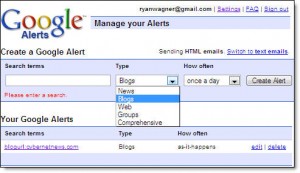Google has a very useful service, which can help you grow business and get more publicity. And the best part it’s FREE!
It’s like a having a a research assistant or a media clipping service which scrutinizes both the web and Google News database, then sends you an email as soon as something you’re interested in appears in the search results.

For instance, let’s say you’re a big fan of “Star Wars”. You can set up a Google Alert for “Star Wars”. Then whenever Google finds any mentioned in a top news story or on the web, you’ll get an email including the web site address so you can go see where and how “Star Wars” is mentioned.
To set up your own Google Alerts for free, just go to http://www.google.com/alerts. The exciting thing is you can use this service to grow your business in all sorts of ways.
Some of the obvious ways to use it include setting up alerts to see what others are saying about you online, ‘discover’ what they saying about your competitors, find out about new developments in your field of expertise and/or discover some other prominent with whom you might want to ally yourself in some way.
This service is also a great publicity tool and it’s FREE! Here are three tips to use Google Alerts to get publicity:
Tip #1 –
Get instant publicity by tying-in with news stories.
One of the easiest ways to obtain FREE publicity is to be able to comment on what’s already breaking in the news. For instance, one of my clients, Gerry Robert, best selling author, book writing coach, and author of Millionaire Mindset.
One of the strategies we employ whenever an alert pops up having to deal Wealth, Book Writing, Economy somewhere in America or Canada, you need to contact the media in that city immediately and let them know you can comment on what’s breaking.
Robert then asked, ‘But how will I know when a related story hits the news?’
My answer: “Google Alerts.”
The results will blow you away!
Tip #2–
Building friendships with media contact who discuss your topic.
Another of my clients, Patrick Snow, also uses Google Alerts service in a very systematic way to get publicity.
Here’s what Patrick does: First he set up alerts to track stories written on his area of expertise, which is Success, Selling and Families.
When he gets an alert email pointing him to a good story on that subject, he then sends the journalist who wrote the story a short email saying he enjoyed article and offers a sincere compliment.
His email stands out because journalists don’t often hear from their readers and when they do it’s usually to complain. Within his email Patrick mentions his website CreateYourOwnDestiny.com to reinforce his credibility.
If the journalist writes him back and thanks him for his comments, Patrick then offers to send them a free copy of his book and mentions he’s happy to be a resource for them on any future stories they might do on this or similar topics.
Patrick Snow has made the front cover of USA Today and multiple TV/Radio interviews.
Tip#3
The Hook is more than Book
Writers and authors are always asking me about a good ‘hook’ or angle should be when approaching the media. I’ll immediately ask them, “What hooks have others used in your industry?”
Usually they don’t know, but by using Google Alerts (or even just searching the Google News database at http://www.google.com/news) you can quickly find video clips, articles in which others with similar expertise are quoted.
For example, let’s say you’ve written a book about Selling. Suppose also that you’re based in Phoenix. One day you discover a story in the Chicago Times about Selling in the New Economy. Well, if it’s newsworthy in Chicago, it’s probably going to be considered newsworthy by the media in your city. So pitch your local media on doing the same story, only this time they’ll be interviewing YOU as the expert.
Here are a few words of advice on implementing this strategy:
Use quotation marks to narrow your alerts, for instance, I have an alert set up for Bert Martinez and because I’m not the only person in the world with the name Bert or Martinez, I get a lot of off-target alerts. Every time Bert or Martinez pop up I received an alert by using quotation marks, “Bert Martinez”, it allows me to receive more exact searches.
Google Alerts are useful to:
- monitor a developing news story
- keep current on a competitor or industry
- learn where you or your company is cited or quoted
- get the latest on a celebrity or event
- keep tabs on your favorite sports teams
- find when people link to your site
- discover new websites on a certain topic
and more.








